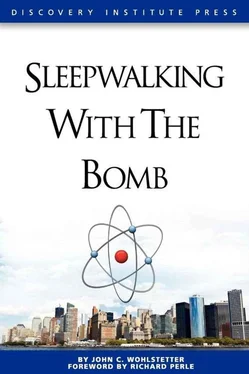John Wohlstetter - Sleepwalking with the Bomb
Здесь есть возможность читать онлайн «John Wohlstetter - Sleepwalking with the Bomb» весь текст электронной книги совершенно бесплатно (целиком полную версию без сокращений). В некоторых случаях можно слушать аудио, скачать через торрент в формате fb2 и присутствует краткое содержание. Город: Seattle, Год выпуска: 2012, ISBN: 2012, Издательство: Discovery Institute Press, Жанр: История, military, Политика, Публицистика, на английском языке. Описание произведения, (предисловие) а так же отзывы посетителей доступны на портале библиотеки ЛибКат.
- Название:Sleepwalking with the Bomb
- Автор:
- Издательство:Discovery Institute Press
- Жанр:
- Год:2012
- Город:Seattle
- ISBN:978-1-93659-906-6
- Рейтинг книги:3 / 5. Голосов: 1
-
Избранное:Добавить в избранное
- Отзывы:
-
Ваша оценка:
- 60
- 1
- 2
- 3
- 4
- 5
Sleepwalking with the Bomb: краткое содержание, описание и аннотация
Предлагаем к чтению аннотацию, описание, краткое содержание или предисловие (зависит от того, что написал сам автор книги «Sleepwalking with the Bomb»). Если вы не нашли необходимую информацию о книге — напишите в комментариях, мы постараемся отыскать её.
RICHARD PERLE, Resident Fellow, American Enterprise Institute and Assistant Secretary of Defense, 1981–1987 Sleepwalking with the Bomb
Sleepwalking with the Bomb — читать онлайн бесплатно полную книгу (весь текст) целиком
Ниже представлен текст книги, разбитый по страницам. Система сохранения места последней прочитанной страницы, позволяет с удобством читать онлайн бесплатно книгу «Sleepwalking with the Bomb», без необходимости каждый раз заново искать на чём Вы остановились. Поставьте закладку, и сможете в любой момент перейти на страницу, на которой закончили чтение.
Интервал:
Закладка:
Also at issue would be the huge political impact of breaking a “nuclear taboo” that has existed since the end of World War II. Allied powers in the West have long stressed the “firebreak” between conventional and nuclear use, a concept that makes the decision to use nuclear weapons one far more than a mere continuance of gradual war escalation. The Soviet Union showed no signs of recognizing this firebreak; nor should we assume that emerging powers would. But the United States should not be the nation to disregard it.
According to Herman Kahn, the RAND corporation genius who could both joke and think clearly about “the unthinkable,” to break the taboo against using nuclear weapons would be to court unpredictable, potentially horrific dangers. The value of the taboo, Kahn explained in his 1965 book, On Escalation, is that, “once war has started no other line of demarcation is at once so clear, so sanctified by convention, so ratified by emotion, so low on the scale of violence, and—perhaps most important of all—so easily defined and understood as the line between not using and using nuclear weapons.”
He held that breaching the taboo, especially more than once, would be to weaken it forever:
[T]wo or three uses of nuclear weapons would certainly weaken the nuclear threshold, at least to a degree where it would no longer be a strong barrier to additional uses of nuclear weapons in intense or vital disputes. There would ensue a gradual or precipitate erosion of the current belief… that the use of nuclear weapons is exceptional or immoral. The feared uncontrolled escalation would be rather more likely to occur at the second, third or later use of nuclear weapons than as a consequence of first use.
He reminded his readers of the situation in which the world has always found itself. He feared that once broken the nuclear taboo might never be restorable:
[I]n a world in which there is no legislature to set new rules, and the only method of changing rules is through a complex and unreliable systems-bargaining process, each side should—other things being equal—be anxious to preserve whatever thresholds there are. This is a counsel of prudence, but a serious one: it is not often possible to restore traditions, customs or conventions that have been shattered. Once they are gone, or weakened, the world may be “permanently” worse off.
Thus, because of the danger to Seoul, two atom bombs dropped on Japan, and the nuclear taboo, the Western powers arrayed against North Korea cannot contemplate nuclear first use—absent absolutely certain intelligence that a nuclear strike from North Korea is imminent. After the WMD intelligence fiasco in Iraq—CIA director George Tenet famously told Congress in 2002 that the continued presence of weapons of mass destruction in Iraq was a “slam dunk”—the standard of proof to convince skeptics has become absolute certitude.
Tomorrow’s Korea: The Double-Edged Sword of Reunification
WHAT CHINA fears above all is a reunified Korea allied with the West, sitting on its border. Reunification, the stated goal of South Korean policy, envisions a democratic state living in peace alongside its neighbors. But a prosperous, democratic, unified Korea clearly would incite more unrest in China among those chafing under the rule of aging autocrats.
Even if the most beneficial kind of regime change—reunification—were to come to pass, the problems would be monumental. Combining an advanced industrial society with a stupefyingly backward, desperately poor garrison state run like a concentration camp for more than six decades is a far more difficult task than reunifying West and East Germany—which was still a difficult task, although the latter was not nearly as backward or poor as North Korea.
Thus South Korea itself, as well as China, should fear reunification. The 1990 reuniting of West and East Germany added to West Germany’s 61.4 million nearly 17 million people—all of them a generation behind the West Germans in economic development. The 1990 per capita GDP of West Germany was $24,485; the 1990 East German figure was $10,430, making the Western population two and one-third times more productive per year. By 2008, after nearly 2 trillion dollars spent in re-unification costs, the combined figure for Germany stood at $35,400, but East Germans continued to lag far behind their Western countrymen. Reuniting the North’s 24 million with the South’s 49 million people is a 50 percent population add-on for the South (versus 29 percent for West Germany). South Korea’s 2010 per capita GDP was $30,200, nearly 17 times North Korea’s 2009 figure of $1,800. The difference is seven times bigger than the gap West Germany faced in absorbing the East.
Moreover, while East Germans were not schooled in entrepreneurial ways, they knew some semblance of economic life. North Korea has virtually no civilian sector at all. Its people have no real idea how to function in a modern economy like that of South Korea. Sadly, the Cold War jest about Russian factory workers wondering why, if they work in a baby carriage factory, all they can assemble are machine guns likely describes much of the North Korean economy.
Finally there is massive malnutrition in the North. The estimates of people dying of starvation during Kim Jong-Il’s 17-year rule run over 2 million. The surviving population’s physical growth is stunted. The public health and economic implications are simply staggering. For the South, the ancient Chinese admonition about being careful what you wish for may prove all too applicable if the South absorbs the primitive Hermit Kingdom.
Only reunification can end the North Korean nuclear threat. Such would prove a security boon to South Korea and the U.S. as principal nuclear guarantor of the South. But reunification might bankrupt the South. At minimum, the economic strain would be severe, with ultimate success by no means guaranteed.
That the Hermit Kingdom has endured for more than sixty years, despite serial aggressive behavior, mass starvation of its people, and development of a rogue nuclear weapon capability, attests anew to the validity of the Fourth Lesson of nuclear-age history: NUCLEAR WEAPONS GIVE NATIONS A “DYING STING” CAPABILITY THAT VIRTUALLY PRECLUDES PREEMPTIVE ACTION AND CONFERS NEAR-TOTAL SURVIVAL INSURANCE.
7.
CHINA: IMPERIAL ASPIRATION AMIDST A SHIFTING NUCLEAR BALANCE
Political power grows out of the barrel of a gun.
—QUOTATIONS FROM CHAIRMAN MAO ZEDONG , A.K.A. THE LITTLE RED BOOK (1966)CHINA’S DRIVE TO REGAIN ITS ERSTWHILE POSITION AS A PREEMINENT world power is but a generation old. Its effort to regain what it regards as its rightful place begins with supremacy in the western Pacific region. It is this intensely felt national ambition that makes ultimate confrontation between China and the United States, currently the world’s preeminent Pacific power, increasingly likely, though strategic accommodation remains a distinct possibility.
Such a confrontation could come as early as the end of this decade. And if it occurs, it could lead—even without either the U.S. or China desiring it—to a regional conflict, possibly involving the use of nuclear weapons. China is not a revolutionary power like Iran, with ambitions to remake the world order. Nor is it a rogue power like North Korea, utterly indifferent to world concerns. It is, as is Russia, a rival: it desires to supplant the U.S. as the most influential world power, starting in Asia, then projecting influence globally. It does not, like Iran, wish to destroy America; China’s fortunes are inextricably linked with ours in many ways.
But because China’s drive for ascendancy carries risk of a confrontation with the U.S., miscalculation during a crisis could lead to a war neither side desires. What emerges clearly in considering the U.S.-China relationship is the Fifth Lesson of nuclear-age history: THE NUCLEAR BALANCE MATTERS IF ANY PARTY TO A CONFLICT THINKS IT MATTERS, AND THUS ALTERS ITS BEHAVIOR.
Читать дальшеИнтервал:
Закладка:
Похожие книги на «Sleepwalking with the Bomb»
Представляем Вашему вниманию похожие книги на «Sleepwalking with the Bomb» списком для выбора. Мы отобрали схожую по названию и смыслу литературу в надежде предоставить читателям больше вариантов отыскать новые, интересные, ещё непрочитанные произведения.
Обсуждение, отзывы о книге «Sleepwalking with the Bomb» и просто собственные мнения читателей. Оставьте ваши комментарии, напишите, что Вы думаете о произведении, его смысле или главных героях. Укажите что конкретно понравилось, а что нет, и почему Вы так считаете.












